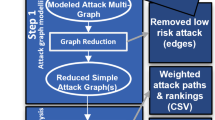Abstract
Cyber-physical systems (CPSs) are becoming increasingly important in safety-critical systems. Particular risk analysis (PRA) is an essential step in the safety assessment process to guarantee the quality of a system in the early phase of system development. Human factors like the physical environment are the most important part of particular risk assessment. Therefore, it is necessary to analyze the safety of the system considering human factor and physical factor. In this paper, we propose a new particular risk model (PRM) to improve the modeling ability of the Architecture Analysis and Design Language (AADL). An architecture-based PRA method is presented to support safety assessment for the AADL model of a cyber-physical system. To simulate the PRM with the proposed PRA method, model transformation from PRM to a deterministic and stochastic Petri net model is implemented. Finally, a case study on the power grid system of CPS is modeled and analyzed using the proposed method.
Similar content being viewed by others
Explore related subjects
Discover the latest articles and news from researchers in related subjects, suggested using machine learning.References
Banerjee A, Kandula S, Mukherjee T, et al., 2012. BAND-AiDe: a tool for cyber-physical oriented analysis and design of body area networks and devices. ACM Trans Embed Comput Syst, 11(S2):49–77. https://doi.org/10.1145/2331147.2331159
Bi SY, 2017. Research on Tire Burst Safety Analysis Technology of Transport Category Aircraft. MS Thesis, Nanjing University of Aeronautics and Astronautics, Nanjing, China (in Chinese).
China Institute of Building Standard Design & Research, 2012. Technical Code for Protection of Building Electronic Information System Against Lightning. GB 50343-2012. National Standards of People’s Republic of China (in Chinese).
Delange J, Feiler P, 2014. Architecture fault modeling with the AADL error-model annex. Proc 40th EUROMICRO Conf on Software Engineering and Advanced Applications, p.361–368. https://doi.org/10.1109/SEAA.2014.20
Dong YW, Wang GR, Zhang F, et al., 2011. Reliability analysis and assessment tool for AADL model. J Softw, 22(6):1252–1266 (in Chinese). https://doi.org/10.3724/SP.J.1001.2011.04014
Gertman DI, Blackman HS, 1994. Human Reliability and Safety Analysis Data Handbook. Wiley-Interscience, New York, USA.
Ji Z, Zhou YH, Wang BC, et al., 2019. Human-cyber-physical systems (HCPSs) in the context of new-generation intelligent manufacturing. Engineering, 5(4) 624–636. https://doi.org/10.1016/j.eng.2019.07.015
Kim J, Jung W, Jang SC, et al., 2006. A case study for the selection of a railway human reliability analysis method. Proc Int Railway Safety Conf, p.22–27 (in Korean).
Kirwan B, Kennedy R, Taylor-Adams S, et al., 1997. The validation of three human reliability quantification techniques—THERP, HEART and JHEDI: part II—results of validation exercise. Appl Ergon, 28(1):17–25. https://doi.org/10.1016/S0003-6870(96)00045-2
Luo XL, 2017. Human Factors in Flight (3rd Ed.). Southwest Jiaotong University Press, Chengdu, China (in Chinese).
Marsan MA, Chiola G, 1987. On Petri nets with deterministic and exponentially distributed firing times. In: Rozenberg G (Ed.), Advances in Petri Nets 1987. Springer-Verlag Berlin Heidelberg, p.132–145. https://doi.org/10.1007/3-540-18086-9_23
Reason J, 1990. Human Error. Cambridge University Press, New York, USA. https://doi.org/10.1017/CBO9781139062367
Society of Automotive Engineers, 1996. Guidelines and Methods for Conducting the Safety Assessment Process on Civil Airborne Systems and Equipment, ARP4761. National Standards of the United States of America.
Society of Automotive Engineers, 2013. Architecture Analysis and Design Language (AADL) Annex Volume 3: Annex E: Error Model Annex.
Society of Automotive Engineers, 2017. Architecture Analysis & Design Language (AADL) AS5506C.
Wang Q, Li X, Li S, et al., 2017. Risks and risk control of wind power enterprises. 13th Int Conf on Natural Computation, Fuzzy Systems and Knowledge Discovery, p.3070–3075. https://doi.org/10.1109/FSKD.2017.8393275
Wei XM, Dong YW, Yang MM, et al., 2014. Hazard analysis for AADL model. Proc IEEE 20th Int Conf on Embedded and Real-Time Computing Systems and Applications, p.1–10.
Wei XM, Dong YW, Li XL, et al., 2018. Architecture-level hazard analysis using AADL. J Syst Softw, 137:580–604. https://doi.org/10.1016/j.jss.2017.06.018
Wei XM, Dong YW, Sun PP, et al., 2019. Safety analysis of AADL models for grid cyber-physical systems via model checking of stochastic games. Electronics, 8(2):212. https://doi.org/10.3390/electronics8020212
Zimmermann A, 2017. Modelling and performance evaluation with TimeNet 4.4. In: Bertrand N, Bortolussi L (Eds.), Quantitative Evaluation of Systems. 14th Int Conf on Quantitative Evaluation of Systems, p.1–4.
Zou Y, 2015. Research on Fault Probability Model of Overhead Power Transmission Line Based on Environmental Factors. MS Thesis, Huazhong University of Science and Technology, Wuhan, China (in Chinese).
Author information
Authors and Affiliations
Corresponding authors
Additional information
Project supported by the State Power Grid Company Science and Technical Plan Project, China (No. 5100-201940008A-0-0-00)
Contributors
Ming-rui XIAO and Yun-wei DONG designed the research. Qian-wen GOU, Feng XUE, and Yong-hua CHEN processed the data. Ming-rui XIAO drafted the manuscript. Yun-wei DONG helped organize the manuscript. Ming-rui XIAO and Yun-wei DONG revised and finalized the paper.
Compliance with ethics guidelines
Ming-rui XIAO, Yun-wei DONG, Qian-wen GOU, Feng XUE, and Yong-hua CHEN declare that they have no conflict of interest.
Rights and permissions
About this article
Cite this article
Xiao, Mr., Dong, Yw., Gou, Qw. et al. Architecture-level particular risk modeling and analysis for a cyber-physical system with AADL. Front Inform Technol Electron Eng 21, 1607–1625 (2020). https://doi.org/10.1631/FITEE.2000428
Received:
Accepted:
Published:
Issue Date:
DOI: https://doi.org/10.1631/FITEE.2000428
Key words
- Human-cyber-physical system (HCPS)
- Particular risk analysis
- Architecture Analysis and Design Language (AADL)
- Deterministic and stochastic Petri net (DSPN)
- Particular risk model




